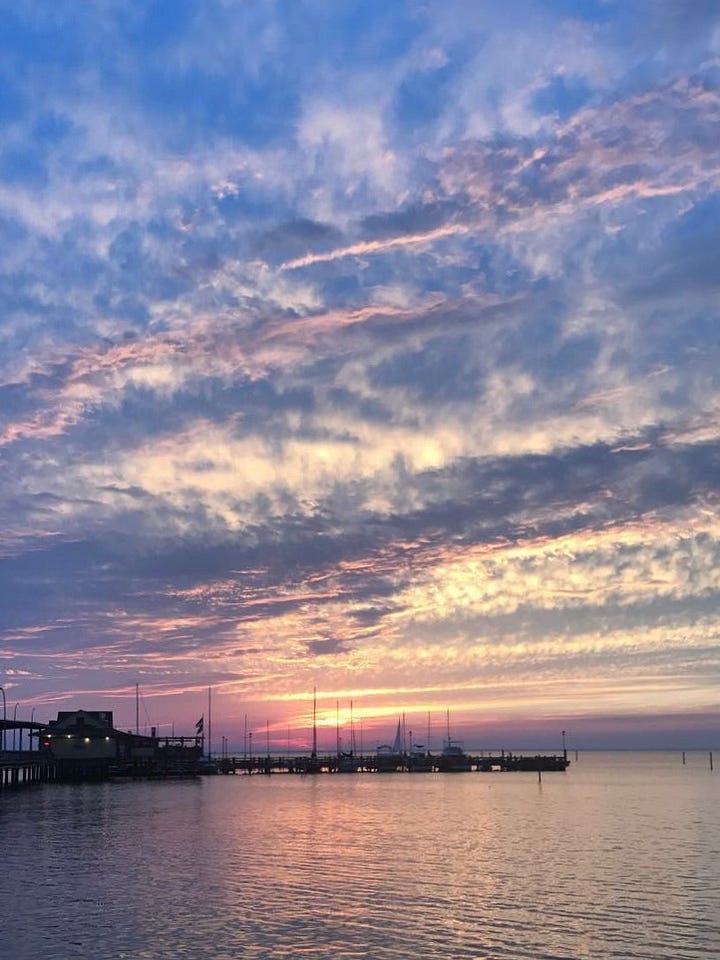Alabama the Beautiful, America the Damned
On The University of Alabama's 2025 Commencement Speaker
There is a place where kudzu grows wild and the rain never drizzles, always pours. Cows litter roadside rolling pastures, alligators wait in the wetlands’ wings. All of nature meditates and the sky says its prayers before bed.
Summers are spent with the smells of lawn clippings and honeysuckle. Winters without a heavy coat. Tea is served cold, sickeningly sweet. Strangers are few and far between, but they all wear a smile.
Recipes are passed down. Prejudices, too. Redlines are maintained, education underfunded, history selective. Tradition overvalued, unanimity assumed.


I found out Donald Trump will speak at my alma mater’s 2025 commencement ceremony from an Instagram post.
The day before, I discovered the Pope had passed away via an X Pop Base notification about JD Vance.
These feel like the latest in a lineup of increasingly bizarre, dystopian news events spanning back almost a decade now. With each installment, the threshold for the absurd inches higher; I become less shock-able, more numb.
I’m not alone in feeling this way, I know.
My peers ran to the comments, reposted to their Instagram stories, shared petitions. I sat back and watched, unsure of what I could say that hasn’t already been said.
On a weekly basis, I oscillate between so much disappointment, anger, fear, and helplessness. Social media activism feels performative, talking to my friends doesn’t feel like enough. The result is that I often don’t do anything; I dissociate.
My silence isn’t complicity, but I know it doesn’t hurt their cause. So, although it feels nearly impossible to articulate all of my thoughts, I think I need to try.
Next to sugarcane and cotton, I am a product of the South.
Every generation of my family I can name hails from Louisiana or Alabama. Inhabitants of Cajun bayous and backwards backwoods, victims of the unachievable American Dream and shrinking middle class, successfully angered and incentivized by inciting politicians —these are my family. This is where I come from.
It’s hard to explain, even to myself, how the shift happened in me. It was 2020, and months of digging up the roots.
Young, rightfully angry, and determined to assert my differing identity, I rejected—rather heavy-handedly— almost everything I’d ever known; tore down the plantation-style columns of the houses that built me, burned bridges, locked myself in my ivory tower.
The University of Alabama was my site of revelation, my safe haven of progress, what nurtured my anger and offered activism instead, where I found like-minded community and belonging in the chaos.
With the help of my professors, I named my experiences and put them in their appropriate sociopolitical contexts. I began to conceptualize my circumstances as symptomatic of larger systems at play, and to understand my role in them.
And eventually, after significant damage had already been done, I started to hate my origins less. I started reconstructing my bridges.
Much like with the University itself, which was built with the labor of enslaved people whose fingerprints are still stamped on the buildings’ bricks, I realized you can’t so easily separate the present from its not-so-distant past.
We are, after all, still an institution funded by the physical labor of Black bodies. Now, they are just donned in football jerseys and celebrated; fingerprints replaced with plaque-adorned hands and feet decorating different cement —we call it the Walk of Fame. “Built by Bama,” indeed, but also responsible for its building.
It is a tangled, fraught history; a contested identity we all share.
There are the sorority mansions and the Machine, yes, but also the diversity of our student body, the breadth of our talent, interest, and heart.
Mostly, from my time at the University of Alabama, I learned that multiple things can be true at once.
The University of Alabama faculty and staff are not represented by Donald Trump. The 2025 graduating classes —full of the bright, ambitious, curious minds of our future— are sorely misrepresented by Donald Trump.
Donald Trump is and always has been a figurehead of the 1%, of egregious wealth and pompous, arrogant power, and his attendance at this year’s commencement ceremonies reflect the stronghold his office has on Alabama’s administration, nothing more. It is merely a confirmation of what we’ve always known: power pools at the top.
These proceedings can cause us to lose faith in our authority figures, but we cannot allow it to rob us of our faith in one another.
It is the smoking gun of my privilege that it took me until 2020 to become a politically conscious person. It is one of the big breaks of my life that I had the cushion of Alabama’s campus community to make a crash landing on.
The dissension this decision has caused captures Alabama in all its contradictions; every step we make forward seems to be cursed with two steps back. And at different points in my life, I have been on both sides of the argument.
All I can say is that growing up in the South I believed in and deeply trusted the people around me. I still love them, and I understand where they are coming from; I know all too well how easily anger can be misdirected.
And still, I know the South can change; I am living proof of it.
I keep coming back to something a fellow alumnus I have never met said, via Instagram stories reshared by a mutual friend:
“The administration may be allowing this but I want to note that Alabama will forever be the place where I was taught, by deeply compassionate and honestly overqualified professors, to see the world in a broader and bigger light than my own, where I developed deeper empathy and where I began to believe in a better world.
“They might think the south is their safe haven, but that’s because they’re scared to lose it. The south is the forefront of our revolution, and there are people fighting every day for it. Sad to see UA will continue to be on the wrong side of history. F*ck Donald Trump.”
—@exxtratrestrail, asterisk mine







Welcome back Harper Lee
Extremely well written!